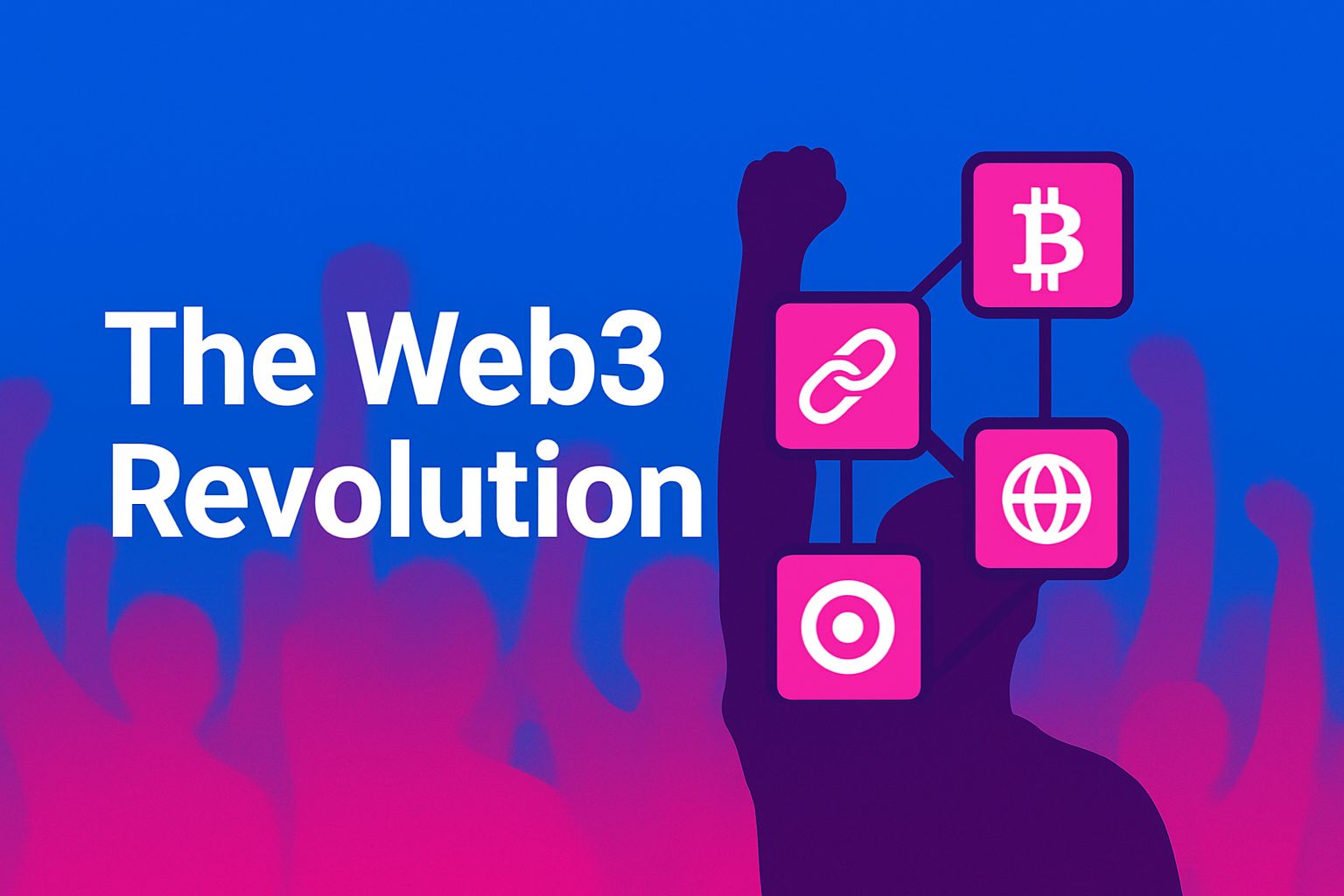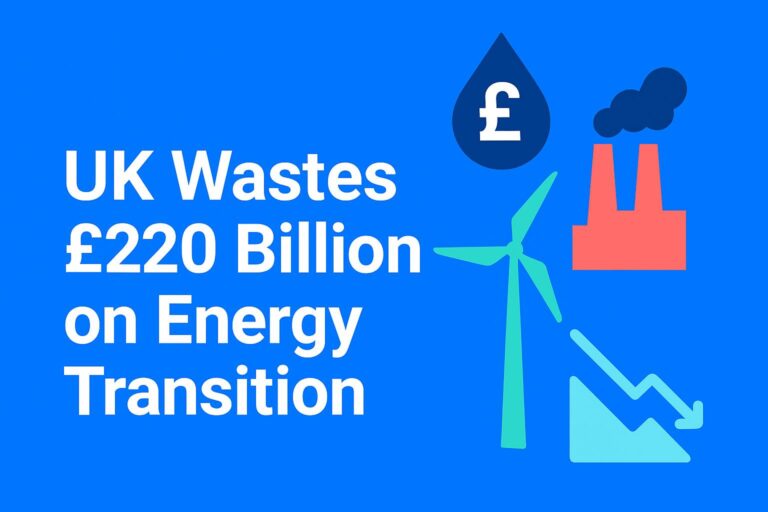How Decentralised Tech is Creating New Opportunities for Startups…
The internet is quietly undergoing what many describe as its most significant change since the advent of the internet. Web3, often called the decentralised internet, is reshaping how we think about digital ownership, data control and online interactions. For tech startups, this represents not just another technological trend, but a complete shift that creates entirely new categories of business opportunities. Unlike previous internet evolutions that primarily enhanced existing models, Web3 introduces revolutionary concepts that challenge the foundational assumptions of digital business. From user-owned data to programmable money, from decentralised autonomous organisations to tokenised economies, Web3 opens possibilities that simply didn’t exist before.

The Evolving Internet
Web3 represents the third generation of internet development, building on the foundation of Web1 (static websites) and Web2 (interactive, social platforms). The core innovation lies in decentralisation, which looks to remove intermediaries and give users direct control over their data, assets and digital interactions through blockchain technology. The significance becomes clear when examining the current internet landscape. Web2 created enormous value but concentrated it within a handful of platform companies. Users generate content and data but rarely own or directly monetise these contributions.
Why Does it Matter?
Web3 flips the Web2 model, enabling users to own their digital assets, control their data and participate directly in the economic value they create. This shift is already gaining substantial momentum. Over 5,700 Web3 startups have been founded since 2007, resulting in over $42 billion in venture capital investment. Meanwhile, more than 50 million users around the globe actively use Web3 applications, demonstrating growing adoption of decentralised technologies. The enterprise adoption is equally compelling. A Coinbase survey revealed that 56% of Fortune 500 executives are actively working on on-chain projects, indicating that Web3 is moving beyond speculative interest to practical business applications.
How Web3 is Different
The change Web3 brings to internet infrastructure touches every aspect of digital interaction, from data storage to financial transactions to content creation and distribution.
- Ownership and Control
In Web2, platform companies own user data and content. Web3 enables true digital ownership through blockchain-based assets, allowing users to maintain control regardless of platform changes or business decisions.
- Economic Models
Traditional internet platforms monetise through advertising and data collection. Web3 introduces tokenised economies where users can directly earn from their contributions through various mechanisms including governance tokens, creator coins and yield farming.
- Trust and Verification
Current internet systems rely on centralised authorities for trust and verification. Web3 uses cryptographic proofs and consensus mechanisms, reducing the need for trusted intermediaries in many transactions and interactions.
- Interoperability
Web2 platforms often create walled gardens that lock in users and data. Web3 protocols are designed for interoperability, allowing assets and data to move freely between different applications and services.
- Programmable Infrastructure
Most significantly, Web3 makes the internet programmable through smart contracts, enabling automated execution of complex agreements without intermediaries.
The Financial Scale of Opportunity
The numbers surrounding Web3 development reveal an ecosystem experiencing explosive growth. In 2023, venture capital investments in blockchain startups reached USD 30 billion, highlighting sustained investor confidence despite market volatility.
Market projections suggest this is just the beginning. The public blockchain segment dominated the market in 2023 and accounted for 56.4% share of global revenue, while financial services applications are leading adoption with around 46.7% of finance apps now leveraging Web3 technology.
The enterprise market represents particularly significant potential. Gartner predicts that 25% of enterprises will use centralised services wrapped around decentralised Web3 applications by 2027, indicating substantial business-to-business opportunities as companies seek to integrate blockchain capabilities with existing systems.
What Web3 Means for Tech Startups
For tech startups, Web3 represents a fundamental expansion of addressable markets and business model possibilities. Unlike incremental improvements to existing technologies, Web3 creates entirely new categories where incumbents have no inherent advantage.
- Reduced Barriers to Financial Services
Decentralised Finance (DeFi) allows startups to build financial products without traditional banking infrastructure or regulatory overhead in many jurisdictions. This democratisation enables financial innovation that was previously impossible for small companies.
- Direct Monetisation Models
Web3 enables startups to create token-based economies where users become stakeholders in platform growth. This aligns incentives between companies and communities while providing multiple revenue streams beyond traditional advertising or subscription models.
- Global Market Access
Blockchain infrastructure operates across borders without traditional payment processing limitations. Startups can access global markets from day one, accepting cryptocurrency payments and serving users regardless of their local banking infrastructure.
- Composable Infrastructure
Web3 protocols are designed to work together, allowing startups to build on existing blockchain infrastructure rather than creating everything from scratch. This composability accelerates development timelines and reduces technical risk.
- Community-Driven Growth
Token-based incentive systems enable startups to bootstrap network effects through economic incentives rather than relying solely on product utility. Early users become stakeholders with financial motivation to drive adoption.
- Data Sovereignty
In Web3, users control their data, but startups can still access valuable insights through opt-in mechanisms and privacy-preserving technologies. This creates opportunities for data-driven products that respect user privacy while generating business value.
Key Web3 Business Opportunities for Startups
The Web3 ecosystem offers numerous business opportunities across different sectors and technical approaches:
- Decentralised Finance (DeFi)
DeFi is one of the most popular Web3 business ideas, encompassing lending protocols, decentralised exchanges, yield farming platforms and sophisticated financial derivatives. These applications recreate traditional financial services without centralised control.
- NFT and Digital Assets
Beyond art and collectibles, NFTs enable ownership of digital content, in-game assets, virtual real estate and intellectual property. Startups can build marketplaces, creation tools or entirely new asset categories.
- Infrastructure and Developer Tools
The Web3 ecosystem needs extensive infrastructure including blockchain networks, development frameworks, security auditing services and user interface tools. SaaS models for blockchain dev tools are also gaining traction.
- Gaming and Metaverse
Play-to-earn gaming models allow players to own in-game assets and earn cryptocurrency through gameplay. Virtual worlds create opportunities for digital land development, virtual goods and immersive experiences.
- Content and Creator Economy
Content monetisation business models help content creators maintain ownership and ultimately own their content by turning writing or posts into digital assets such as NFTs.
- Enterprise Solutions
Companies need help integrating blockchain technology with existing systems, managing digital assets and implementing smart contracts for business processes.
Technical Considerations and Challenges
While Web3 presents significant opportunities, startups must navigate several technical and market challenges:
- Scalability
Current blockchain networks face transaction throughput limitations compared to traditional databases. However, layer-2 solutions and improved consensus mechanisms are rapidly addressing these constraints.
- User Experience
Web3 applications often require users to manage private keys, understand gas fees and navigate complex interfaces. Startups succeeding in this space focus heavily on abstracting technical complexity from end users.
- Regulatory Uncertainty
The pace of innovation in Web3 often outstrips the ability of regulators to adapt, creating gaps and uncertainties. However, clear regulations provide assurance to retail and institutional investors, driving adoption and liquidity in blockchain markets.
- Energy Consumption
Sustainable blockchain solutions will play a pivotal role in shaping the future of Web3 as more projects adopt green practices and energy-efficient consensus mechanisms.
- Interoperability
While Web3 promises seamless asset transfer between platforms, achieving true interoperability requires ongoing technical development and industry coordination.
What’s Next for Tech Startups?
Several trends are shaping the future of Web3 and creating new opportunities for startups:
- Enterprise Integration
Traditional companies are increasingly exploring blockchain integration for supply chain transparency, tokenised loyalty programs, and decentralised identity solutions. This creates opportunities for B2B Web3 startups serving enterprise clients.
- AI and Web3 Convergence
The intersection of artificial intelligence (AI) and blockchain technology enables new possibilities for autonomous economic agents, decentralised AI training and privacy-preserving machine learning.
- Sustainability Focus
Environmental concerns are driving innovation in energy-efficient blockchain technologies, creating opportunities for startups developing green blockchain solutions.
- Regulatory Clarity
As regulations become clearer, institutional adoption will accelerate, creating larger markets for compliant Web3 applications and infrastructure.
- Mainstream User Experience
Continued improvements in wallet technology, gas fee management and user interfaces will enable broader mainstream adoption, expanding addressable markets for Web3 startups.
Strategic Recommendations for Web3 Startups
Success in the Web3 space requires strategic approaches that account for both the unique opportunities and challenges of decentralised technology. There must be a focus on the user experience, as the biggest barrier to Web3 adoption remains complexity. Startups that successfully abstract blockchain complexity while preserving the benefits of decentralisation will capture the largest markets. Building for interoperability means designing products that work across multiple blockchain networks and protocols. This future-proofs the business and maximises addressable markets.
Web3 success often depends on community engagement more than traditional metrics. Investment must be directed to community building, governance mechanisms and token economics that align user and company incentives. It will be important to stay informed about regulatory developments and design compliance into products from the beginning rather than retrofitting later. When using tokens, you must ensure the economic model creates genuine value rather than relying on speculative trading.
The Web3 Opportunity Window
Web3 represents the most significant technological shift since mobile computing, creating opportunities for startups to build the infrastructure and applications that will define the next generation of the internet. The statistics demonstrate substantial market momentum, with billions in investment flowing into the ecosystem and millions of users already adopting Web3 applications. The question is which companies will capture the value as this ecosystem matures, and mainstream adoption accelerates.
The window of opportunity remains wide open. Incumbent technology companies are still exploring Web3 integration rather than leading it, creating space for startups to establish market positions in this emerging landscape. However, this window won’t remain open indefinitely as traditional tech giants begin to understand and invest in decentralised technologies.
Some Things Change but Others Remain Constant
The startups that succeed in Web3 will be those that combine deep technical understanding with practical business sense, focusing on real user problems rather than just technological possibilities. Ok, so that’s no different than how good tech firms have always succeeded and therein lies the lesson; while the underlying technologies may change, the fundamental business principles do not. However, startups will need to build sustainable economic models, prioritise user experience and create genuine value in the decentralised economy.
Into the Unknown
For founders willing to navigate the technical complexity and regulatory uncertainty, Web3 offers the potential to build businesses that don’t just create value but fundamentally reshape how digital economies function. The decentralised internet is not a distant future, it’s happening right now, and the opportunities for those bold enough to seize them may be unprecedented. I’ve always said working in startups is a voyage of discovery and sailing the Web3 waves is very much a journey into the unknown. Web3 may suit the risk-taking startup culture much more than established corporate giants, who may believe they have more to lose than gain.
You may want to read: “2025 State of B2B Pipeline Growth Report – Summary”







